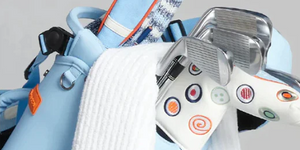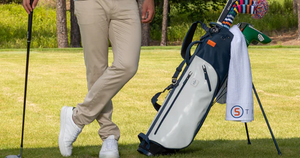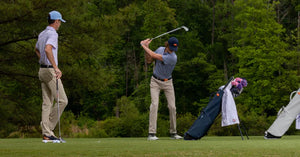What Clubs Should a Beginner Use in Golf?
If you're new to golf and want to improve your skills, you've likely done some research. You may know that it takes fourteen clubs to complete a set – but do you know whether you need a full set?
Someone who's still relatively new to the game won’t need fourteen clubs. Before you know how you play, whether you enjoy the game or not, and how long the interest will last, you just need to focus on refining your skills, stance, and swing.
You only need a core set of clubs to develop these skills as a beginner. Once you have the fundamentals down, you can invest in more clubs later.
So what clubs do you need as a beginner golfer?
Below, we're sharing our expert insight with all you beginners so you can feel confident with the clubs you use to learn. Whether you're buying golf clubs for the first time or trying to take only a select few to the course, knowing which clubs are the most beneficial to beginners is invaluable knowledge.
The Clubs You Need as a Beginner and What They’re Used For
As a beginner, the most important thing to keep in mind when choosing golf clubs is that there is a difference between clubs for professionals and clubs for amateurs.
When you're first starting, your handicap will likely be pretty high, and you can use all the help you can get to improve your shot. Buying forgiving clubs will let you build foundational skills and improve over time.
You can find forgiving clubs of all kinds, from drivers to wedges and irons. While you don't need to get all of these clubs right away, here are the clubs you should plan to invest in as a beginner to build your first set of clubs:
Driver
The driver is one of the most beloved clubs, and it's what most golfers use at the driving range to test their distance. A driver is mostly for tee shots, the first shot you'll take on a hole when you hit the ball from its tee. For many, a driver is what helps them get to the fairway.
A beginner's driver should feel good in your hands and build confidence. It should swing easily.
Irons
Long irons are more challenging, while mid-irons can be of great use for beginners when practicing your full swing.
Long irons are for distance shots—they will help a ball cover lots of ground, but it's probably not going to get the ball in the hole. Long irons become easier to use with practice, but they don't have to be one of your first club purchases.
Focus more of your attention on the mid irons, specifically the 6-iron, 7-iron, and 8-iron. Mid-irons can also be helpful around the green if you need a bump and run shot. Since mid-irons are pretty short, you can use them as you practice to improve your technique.
Another great iron for beginners is the cavity back club, which has a cavity in the back of the iron head. It allows for more mass distribution around the club's perimeter, granting more forgiveness and stability.
Putter
The putter will be the most-used club found in any golf bag, and it requires steady confidence. Using the putter, you can practice a common learning technique: "from the hold outwards.”
Essentially, start your training by getting comfortable putting the ball into the hole. Then, start chipping, and finally, work your way back to the tee shot where it all begins.
Wedges
Pitching and sand wedges are some of the most fun to use on the course. They can help you get out of bunkers, chip from around the green, and pitch from a long distance, and they can be the key to making pars.
Woods or Hybrids
Fairway woods or hybrids are incredibly versatile and can come into the game at any point from the tee to the fairway. They're some of the most flexible clubs you can buy, making them good options for beginner golfers.
What’s the Ideal Club Set-up for Beginners?
If you feel confident that golfing is something you will want to keep up with, investing in a complete set may be worthwhile. But you should know that certain clubs will be more advantageous to you as a beginner (likely) with a higher handicap.
A complete club set-up of fourteen clubs includes one driver, one putter, three wedges, seven irons, and either woods or hybrids to finish the set. If you choose between woods or hybrids as your last few missing pieces, opt for more forgiving hybrids.
If you don't want to make the whole investment up-front, that's completely understandable. Your first-round packing list doesn't need to be a complete set. You can do well with just a driver, a pitching wedge, a sand wedge, a fairway wood, a putter, and your 7-iron, 8-iron, and 9-iron. That's just eight clubs rather than 14.
How to Decide When to Use Each Club
Knowing when to use which clubs is key to improving your golf game. If you're using the wrong clubs, no matter how well you hit the ball, it still might not produce the results you expected.
The best way to determine which clubs you should use and when is to spend time on the driving range. Here, you can get some practice using each of your clubs with proper form to see what kind of distance and performance you have with each.
For example, some people may be able to take long-range shots with drivers. However, you may find that you have a more extended range with woods. You wouldn't know this unless you spent time using each club and hitting balls on the driving range.
You can also use some general guidance when determining which club to use and then see how you perform using those guidelines.
Long-Range Shots
For long-range shots over 200 yards, your accuracy is going to be much more difficult. Most people prefer drivers for these shots rather than woods and hybrids.
However, as a beginner, you may find it’s easier to start with a hybrid. It makes the shot more manageable and is much more forgiving. Alternatively, you could use your 5-iron. Just relax and focus on a smooth swing rather than a hard hit.
Mid-Range Shots
Mid-range shots around 150 yards typically see the best results when players use their irons. Depending on how far you hit the ball, a 7-iron or a 9-iron could work well.
To improve your hit, focus on a small target in the smallest part of the green.
Close-Range Shots
Close-range shots include anything that is 100 yards away or closer. Here, you're going to want to lean on your 9-iron, sand wedge, and putter.
Close range shots are where understanding your skill will make a difference. If you know you do better with short shots when using your 9-iron, feel that shot out and use what instills the most confidence.
Greenside
Once your ball has made it greenside, adjacent to the putting green, the pressure is on—there's only a short distance you'll need to cover to get your ball in the hole.
You might have to get creative with your angles and create a shot to get the job done. The challenges here are why instructors encourage beginners to learn golf from the hole outwards—so you can feel confident when it comes down to the last shot.
To determine the club to use, you first need to determine which shot you'll take. If you have to hit a pitch shot, you should use a wedge to gain the benefits of the loft and spin once your ball lands on the green. If you can putt the ball, use your putter.
If you've ruled out putting and pitching and instead want to chip the ball, figure out how much loft you need. If you need lower-lofted clubs, choose a wood, and if you need maximum loft and roll, opt for a hybrid.
Frequently Asked Questions
How Do I Know What Golf Club To Use for Beginners?
For beginners, a strategic golf club selection is critical. Begin with a driver, putter, and a sand wedge, as well as a 6-iron, 8-iron, pitching wedge, and a fairway wood or hybrid with 18-21 degrees loft to round out your starter set.
Final Thoughts
Getting the hang of golf doesn't need to be complicated. You can either invest in a complete set of clubs or build one with the eight most valuable clubs for beginners. Once you have a set of clubs to pull from, learn how you hit each club and use general guidelines to help you select the right club at the right time.
Ready to go a full 18 holes? Stock up on Stitch golf apparel, golf bags, and more so that you can look like a pro even if you’re a beginner.



